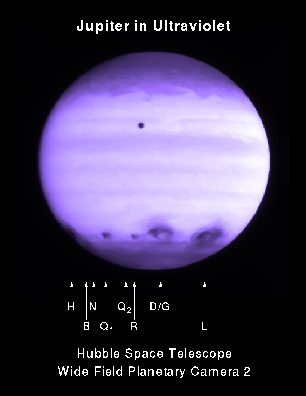

NOTE: Click on the image to view it at its highest resolution.
Ultraviolet image of Jupiter taken by the Wide Field Camera of the Hubble Space Telescope. The image shows Jupiter's atmosphere at a wavelength of 2550 Angstroms after many impacts by fragments of comet Shoemaker-Levy 9. The most recent impactor is fragment R which is below the center of Jupiter (third dark spot from the right). This photo was taken 3:55 EDT on July 21, about 2.5 hours after R's impact. A large dark patch from the impact of fragment H is visible rising on the morning (left) side. Proceding to the right, other dark spots were caused by impacts of fragments Q1, R, D and G (now one large spot), and L, with L covering the largest area of any seen thus far. Small dark spots from B, N, and Q2 are visible with careful inspection of the image. The spots are very dark in the ultraviolet because a large quantity of dust is being deposited high in Jupiter's stratosphere, and the dust abosrbs sunlight. Scientists will be able to track winds in the stratosphere by watching the evolution of these spots.
Credit: Hubble Space Telescope Comet Team
![]() Images, Images, Images
Images, Images, Images
